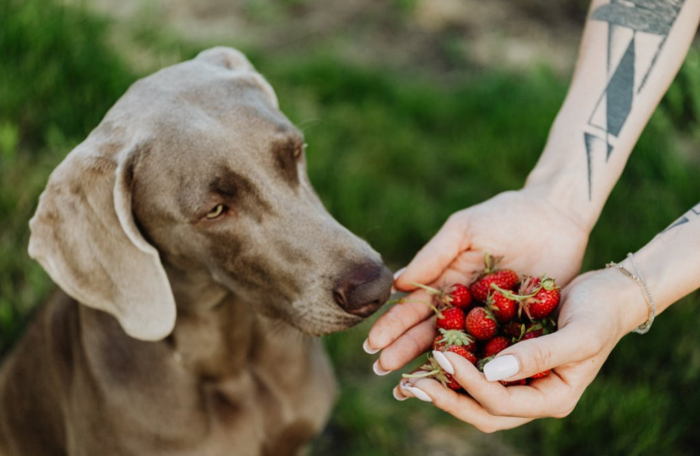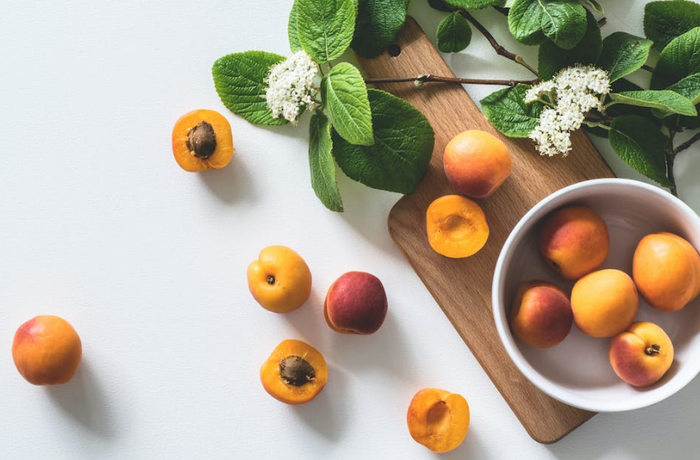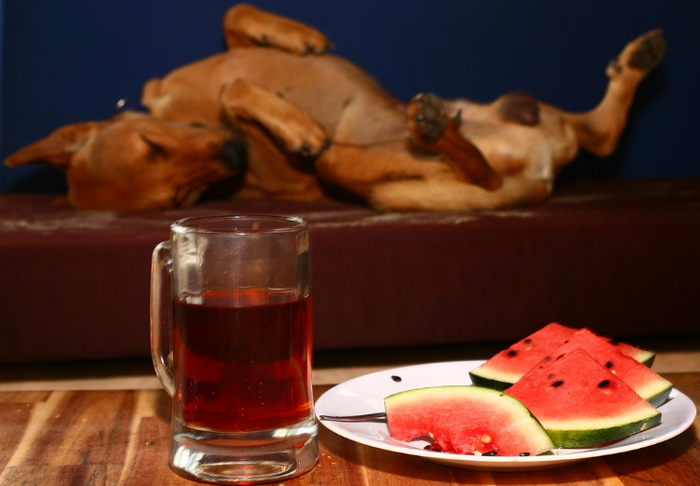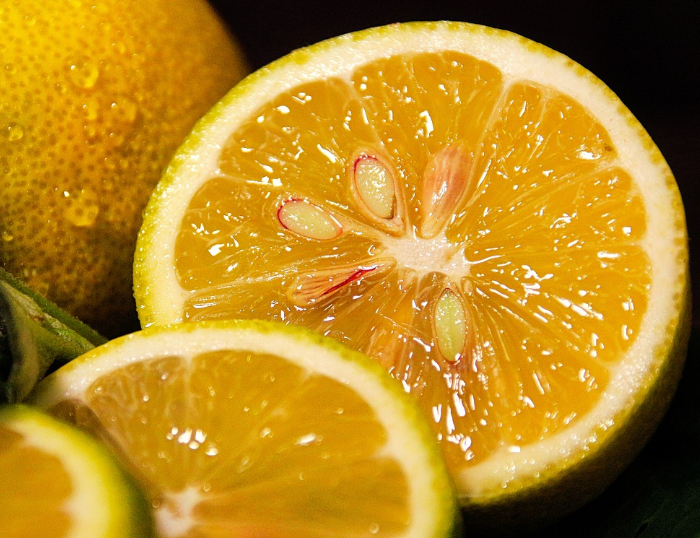2023-07-17
We are constantly reminded of how beneficial fruits and vegetables are for us since we were children. Those of you who have been trying to lead a healthy life as much as possible, are likely to eat fruits and veggies on a regular basis. Fruits are also a wonderful replacement for commercially manufactured products that taste sweet. You may wonder if fruits are also as beneficial for our paw friends as they are for us.

Fruits are a great source of nutrients such as antioxidants, vitamins, and minerals, that help boost the immune system of our paw friends. They are also very beneficial for senior dogs who have joint issues and they can also be used as effective tools against inflammations. Some fruits are even considered “super-foods”, that can help overcome serious illnesses.
Taking the information above into account, should all types of fruits be considered safe for dogs? The answer is “No”. Some fruits can be very beneficial for your paw friend, while others can be toxic and negatively impact their health. Fruits that are not safe for dogs can cause conditions such as diarrhea, and vomiting, but also lead to serious illnesses such as kidney and liver failure, and diabetes.
Let’s start with the berry fruits.
Blueberries
Blueberries are widely known for their health benefits for people. However, your doggy will also benefit from these fruits! Blueberries are rich in antioxidants, vitamin C, K1, manganese, and fiber, which are beneficial for the heart, brain, the immune system in general.
Also, they are considered a good choice for owners who want to keep their dogs on a healthy diet, as blueberries are moderate in sugar, compared to other fruits. They are considered blood-sugar-friendly. However, just like raspberries, these wonderful fruits should not be given as regular meals, but as treats and should not exceed 10% of your paw friend’s calorie intake on a daily basis.
These fruits are known as a source of calcium, manganese, vitamins C, E, and K, and fiber. They are also rich in antioxidants (Anthocyanins), which are responsible for the dark color of these fruits. Blackberries are beneficial for brain function, immunity, and skin and also have inflammatory properties. Blackberry intake reduces the risk of serious illnesses like cancer.
A cup of blackberries contains 84 calories which makes them among the fruits that are low in calories and sugar. Another great advantage of these fruits! As mentioned above, you should feed your doggy reasonable quantities of these fruits and not implement them as a regular part of their daily meal.
Rich in vitamin C, vitamin B, manganese, fiber, potassium, omega-3 fatty acids, iron, magnesium, and fiber...no wonder why raspberries are among the fruits considered “superfoods”. They are also extremely low in sugar- a cup of raspberries contains 5 grams of sugar.
Also, they are recommended to senior dogs thanks to their anti-inflammatory functions. However, raspberries are among the fruits with the highest content of natural xylitol. That is why you should be very careful when feeding your paw friend with raspberries, and you should not exceed the recommended intake of 1 cup or even ½ cup of raspberries at a time (even for dogs of large breeds).
As you may know, xylitol is toxic for dogs, so you should avoid foods that contain xylitol. Also, eating too many raspberries can lead to diarrhea and vomiting.
Strawberries are among the favorite fruits of many people. You may be happy to know that your paw friend can also enjoy these wonderful fruits! Strawberries are rich in many vitamins and nutrients such as vitamin C, vitamin B2, B5, B6, vitamin K, fiber, antioxidants, omega-3 fatty acids, copper, and magnesium, which will help boost your paw friend’s immune system, aid digestion and have benefits for your dog’s skin and coat.
There are still several things you need to keep in mind if feeding your doggy strawberries. Some dogs (as well as people) may have allergic reactions to strawberries, so you should try with a small piece first. Also, you should always carefully wash the fruits (this is actually valid for all fruits you will feed your dog) and chop them into small pieces, to prevent your dog from choking.
Another important thing to remember is that canned strawberries may contain added sugar, so you may want to avoid them. The recommended portion of strawberries for a dog of a small-medium size is 3-4 strawberries, while the recommended portion for larger dog breeds is up to 5 strawberries. Do not incorporate strawberries as a regular part of your dog’s meal, but give them rather as treats.

Cranberries are a great source of vitamin C, vitamin E, vitamin K1, copper, and manganese. They are of great help to dogs who deal with urinary tract infections and also stimulate metabolism, muscle growth, and bone development.
Further benefits of these fruits are that they have anti-inflammatory properties, help maintain proper digestive functions, and also improve heart health. In order to prevent your paw friend from getting their stomach upset, you should limit the daily cranberry intake to several cranberries a day or even to 1-2, if your dog is of a small breed. Otherwise, their stomach may get upset.
Vitamin C, fiber, calcium, phosphorus, and antioxidants- these are among the nutrients apples contain, which make them a great choice to feed our paw friends! Besides providing antioxidants, apples also have anti-allergy properties and contribute to the general health and well-being of our beloved paw family members.
One thing you should keep in mind though is that you should not feed your dog apple seeds. These contain amygdalin, which turns into hydrogen cyanide when chewed. Cyanide is dangerous for both animals and humans when at high levels. Although it is not likely that your dog eats as many apples as needed to get intoxicated, you still may want to remove the seeds prior to feeding them apples.
Also, it is recommended that you chop an apple prior to giving it to your paw friend and always keep the amounts of apples your dog eats in a day moderate- a few slices only.
Bananas are a great choice for canines, who have gastrointestinal issues as they are rich in fiber. These fruits also contain vitamin B6, vitamin C, magnesium, and potassium. They contribute to bone growth and also increase protein production.
Things you should remember when feeding your dog bananas are that these fruits are high in sugar, hence you need to keep your dog’s daily bananas intake moderate.
Also, you should always peel them to avoid intestinal obstruction. As a general rule dogs of large breeds should eat no more than half of a banana per day, while the recommended banana intake for small dogs on a daily basis is 2-3 small pieces.
Pears are rich in antioxidants, vitamins C and K, fiber, and potassium. Pears are higher in copper, zinc, magnesium, calcium, and iron than apples. However, when it comes to vitamins, apples are higher in vitamins A, B1, and E, while pears have a higher content of vitamin B3 and vitamin K. The content of vitamin B2 and vitamin C in both fruits is approximately the same.
Just like other fruits, the daily pear intake should not exceed 10% of your pup’s meal. If your dog is of a small breed, you should not feed them more than a slice. Canned pears as well as canned fruits in general are not recommended for dogs due to their high sugar content.

Fresh apricots are rich in various vitamins and minerals, including vitamins A, C, and E. They also contain lutein, beta-carotene, and potassium and are rich in antioxidants. Some benefits that apricots would have for your dog are associated with cholesterol regulation and constipation relief.
An important thing you should always keep in mind is that apricot pits contain cyanide, which is getting absorbed by the body, once the pit is chewed. That is why it is important that you always remove the pit before you feed your dog an apricot. Also, you should keep the apricot intake moderate. Otherwise, you may cause your paw friend to get their stomach upset.
Vitamin A, vitamin C, vitamin E, vitamin K, magnesium, potassium, zinc, copper, manganese, and phosphorus-these are only a part of the beneficial nutrients peaches contain.
These fruits can be of great help against infections.
However, they also contain a pit, that should be removed prior to feeding your dog peaches. Also, it can get stuck in your dog’s throat. Always be careful when feeding your paw friend fruits that contain a pit (stone). If you notice that this fruit causes diarrhea and upsets your dog’s stomach, you should reduce its amount or completely remove it from your dog’s diet.
These fruits are quite rich in nutrients such as antioxidants, vitamin B6, vitamin C, copper, thiamin, iron, potassium, niacin, riboflavin, potassium, and folate. They help reduce the risk of diseases like cancer, contribute to digestion, boost the immune system, and speed up recovery processes. Pineapples also have anti-inflammatory properties and mitigate symptoms of arthritis. When feeding your paw friend this delicious fruit, you should carefully peel it, remove the crown, and chop it into small pieces.
These exotic tropical fruits are not only delicious but are also a great source of vitamins A, C, K, beta-carotene, magnesium, folate, potassium, and choline. Mangoes are high in sugar, which might lead to increased blood sugar levels, so you should keep track of the amounts of mango you feed your dog. ¼ cup of mango is considered a reasonable amount to feed a dog once a week.
One of the favorite fruits for many people is rich in vitamins including A, B6, and C, as well as potassium. Watermelon can help your paw friend stay hydrated, especially during the hot season, reduces oxidative stress, contributes to preventing macular degeneration, and is beneficial for skin, digestion, and general well-being. You should remove the seeds of this juicy fruit prior to giving it to your dog.
Do not overfeed your dog watermelon, to avoid any issues such as diarrhea. Provide your paw friend with watermelon in the form of treats and keep the watermelon intake within 10% of their diet.

Oranges are another type of fruit that is safe for dogs (of course in moderate amounts). They have many benefits for health as they are rich in vitamin C, fiber, and potassium. As mentioned above, in case you want to feed your dog a fruit that has seeds, these should be removed prior to feeding. Also, do not forget to peel it off.
Although the peels of these fruits are not considered toxic, they may get stuck in your dog’s gastrointestinal tract. Some dogs genuinely enjoy the taste of an orange, while others are not very enthusiastic to eat a fruit with a strong citrus smell.
These are different fruits, that belong to the same specie. In our opinion, they both are extremely delicious! However, are they delicious and more important-safe for dogs?
Yes, they are! Honeydew is a great source of magnesium, calcium, sodium, fiber, vitamins B, C, K, and potassium.
However, Cantaloupe is richer in vitamin C, vitamin A, and beta-carotene than honeydew. You can feed your dog these fruits, but you should remember to remove the seeds and the peel before that. You should feed your dog these two types of fruits in the form of treats or as a supplement to their diet.
In case you are still not familiar with the benefits this fruit provides, you may be interested to keep reading. Kiwi is also considered “superfood”, as it is high in vitamin C, fiber, antioxidants, calcium, potassium, beta-carotene, and lutein.
The nutrients that kiwis contain help boost your paw friend’s immune system, fight infections, and contribute to bone density and muscle development. This fruit can be implemented in your dog’s meal as a treat or supplement and be given after the skin and the seeds have been removed.
Antioxidants, that contribute to repairing damaged cells, lauric acid that helps reduce inflammation, and manganese to support bone development, and metabolism-these are among the benefits that coconuts bring. Coconut oil also finds wide use due to its anti-inflammatory and anti-allergy properties.
However, there are still some risks that may accompany coconut intake such as causing abdominal issues or gaining weight (if given regularly). The husk of this fruit should be removed before you feed your dog. A teaspoon for every ten pounds / 4.5 kilograms weight is considered a reasonable amount of coconut, that your dog’s daily intake should not exceed.
Despite the benefits that grapes have for humans, they are toxic for dogs and should be avoided. Both grapes and raisins can lead to diarrhea and vomiting and even cause dehydration, abdominal pain, and tremors. First symptoms typically occur within 24 hours of ingestion. You should contact a veterinarian as soon as possible.
Considered super-food for humans, avocado is not recommended for dogs. It still has many benefits due to the content of vitamins A, B3, B6, C, and E, fiber, potassium, magnesium, amino acids, folate, antioxidants, healthy fats, and fatty acids.
However, avocado trees contain persin, which is a toxin. Avocado’s flesh has the lowest levels of persin, compared to the leaves, pits, and skin. If your dog eats a small amount of avocado flesh, they are not likely to show any symptoms of intoxication.
Larger amounts of this fruit, as well as digesting any of the parts that are high in persin, can lead to diarrhea, vomiting, and congestive heart failure.

Citrus fruits are not recommended for dogs, as they can upset their digestive system.
Lemons and grapefruits are more acidic than oranges, and their high acidity can cause stomach upset, digestive issues, and discomfort in dogs.
The higher acidity levels in these fruits make them more likely to irritate a dog's gastrointestinal system and potentially lead to more severe symptoms like vomiting or diarrhea.
Additionally, lemons and grapefruits contain compounds called psoralens and essential oils, which can be toxic to dogs.
Lemons are harmful to tooth enamel and also contain chemicals that can lead to vomiting and diarrhea.
Limes contain essential oils that are toxic for dogs and phototoxic compounds.
Grapefruits, on the other hand, contain psoralen, which is also toxic for dogs. The flesh is the safest part of the grapefruit, as the peel, the pit, and the seeds can cause health illnesses such as kidney failure, loss of appetite, and digestive problems.
All the green parts of citrus fruits are toxic for dogs and should be avoided.
When eaten in small amounts, figs can be very beneficial for your dog. They are rich in fiber, calcium, and potassium and contribute to providing important nutrients. They also help the digestive system function normally and teeth and bones stay healthy.
Why then is this fruit considered “dangerous” for dogs? Fig plants are toxic for dogs, especially the leaves, the bark, and the branch. Also, some dogs may be allergic to figs, so you should carefully monitor your dog for any allergic reactions that may occur, in case you would like to feed them small amounts of figs. Dried figs are high in sugar and fat, so you should avoid these.
Cherries are among the favorite fruits for many people due to their sweet-sour taste and juicy flesh. However, the pits, the leaves, and the stems contain cyanide, which is toxic for dogs, but also cherries can cause intestinal obstruction. Our advice is to feed your paw friend cherries only occasionally and in very small amounts with the pits removed.
Similar to other fruits included in this list, plums can be beneficial for your dog’s health as they contain vitamins, such as C and K, minerals, potassium, and antioxidants that boost your paw friend’s immune system.
However, the pits, roots, and leaves are very poisonous for dogs when ingested. Abdominal pain, digestive and respiratory issues are among the symptoms that can appear in the case of consuming a plum. The flesh itself is safe for dogs, but you should make sure that it is good to eat and not moldy.

Fiber, calcium, and vitamins, B and C are among the essential nutrients dates contain. Given in small amounts they can be a healthy supplement to your dog’s meal. However, they are high in sugar and can cause obesity, intestinal obstruction, or diarrhea. Also, you should make sure that you have removed the pit, as it can cause your dog to choke.
Elderberry, holly, juniper, and rowan are poisonous for dogs and other animals and should be avoided.
We highly recommend that you do not feed your dog dried fruits due to the high concentration of sugar. Also, due to the processing they have gone through, can contain additives, which are potentially dangerous for dogs.